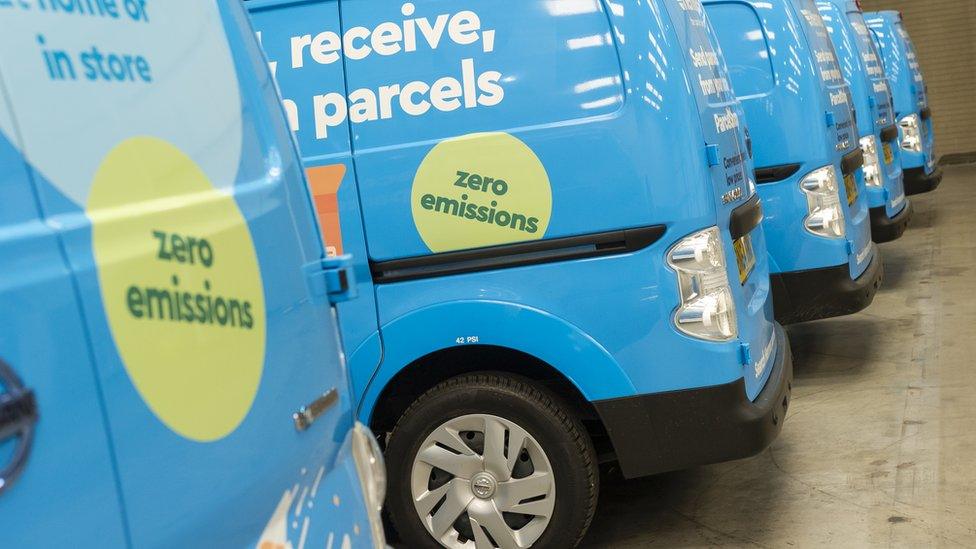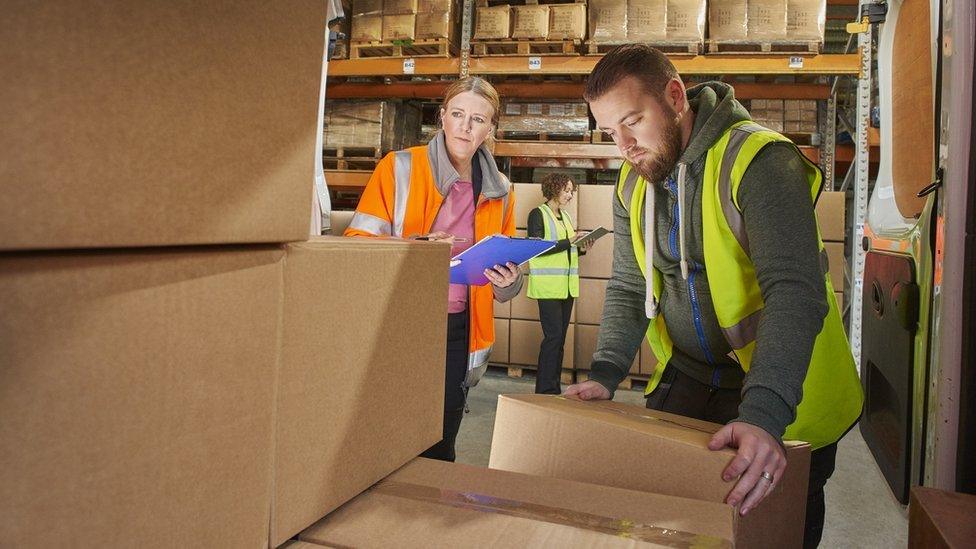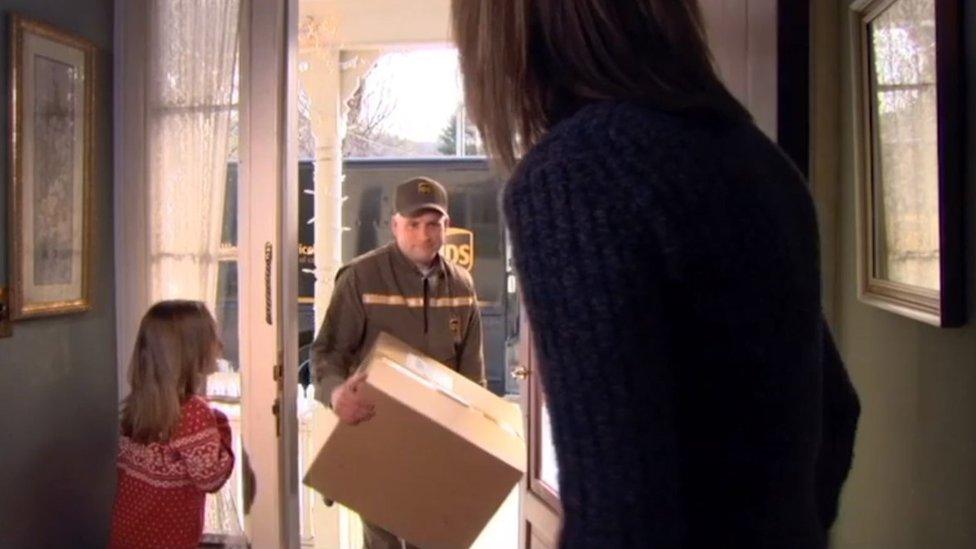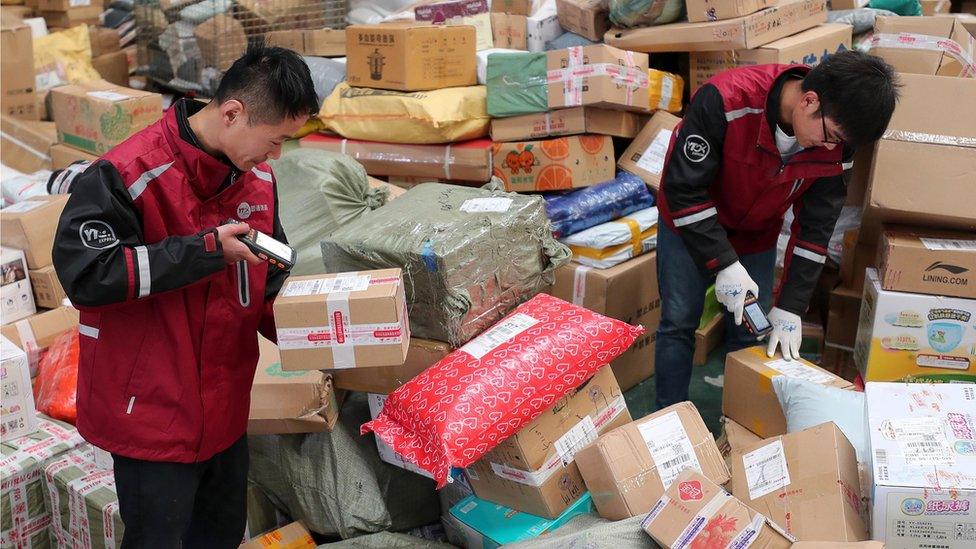'My Christmas parcel ended up being recycled'
- Published

Pippa Park was in less celebratory mood when a present for her sister went astray
Over the Christmas holiday season the number of parcels being delivered goes through the roof, causing headaches for delivery companies and frustration for customers when orders go astray. Can technology cope with the rise and rise of online shopping?
Pippa Park wasn't impressed when the Christmas gift she'd ordered for her sister - a pair of £150 sunglasses - was left in the recycling bin by the delivery company.
An hour before it was due to be emptied by the refuse collectors.
"I wanted to give the present to my sister before she went travelling and the delivery had already taken two weeks," says Pippa, 29, who lives in London.
The glasses got recycled.
Although she was refunded, Pippa says she was left feeling very frustrated by the incident.
And Twitter is awash with complaints from customers about orders that have been lost, delivered to the wrong place, or damaged during transit.

Hermes has to cope with a doubling of delivery volume over the Christmas period
Such frustrations are only likely to grow as courier companies struggle to cope with the surge in online shopping coupled with labour shortages.
"Warehousing, logistics and online systems are all built to cope with average levels of demand, and so come under a lot of stress when volumes rise significantly," says Neil Saunders, managing director at GlobalData Retail.
In the UK between November and December, 387 million parcels are expected to be delivered by retailers - up 13% on last year - says online retail association IMRG.
And in the US, delivery giant UPS expects to deliver nearly 800 million packages globally between Thanksgiving and New Year's Eve, a 38 million increase on last year.
So how will courier companies cope with the increased demand?
"We generally see a 100% increase in the volumes over a very short period of only a couple of weeks," says Jon Ormond, operations director of hubs and depots at Hermes, the German delivery firm.

Parcel tracking is a lot better now but will you be in when the parcel arrives?
"So we have to ensure we have enough resources - labour, delivery couriers, equipment - working round the clock for three weeks to successfully manage the extra volumes, whilst hitting our service level targets."
Hermes expects to handle more than 70 million parcels in the UK alone over November and December, up 7% on last year.
One of the biggest headaches is predicting what the volume of orders is likely to be.
"Getting this wrong either leaves us with unused capacity or unhappy customers," says Mr Ormond.
UPS prepares for a near doubling of its normal daily volume of deliveries over the holiday season by using "advanced automation, operational and customer technologies, and 100,000 seasonal employees worldwide," a spokesman tells the BBC.
But it is also using more modes of transport, including golf carts in some residential areas and electric tricycles in built-up urban centres.
GPS tracking and route planning software have made it easier for customers to see when parcels are likely to arrive, but not being in at the time is a perennial problem.

It's fine if you're at home when the parcel arrives, but where does it go when you're not?
Hermes has launched SafePlace Photo, whereby couriers take a picture of the parcels left in a predetermined or safe location as evidence for customers.
But German clothing giant Zalando and Belgian Post Group have gone a step further and trialled an in-home delivery service in Belgium.
The customer installs a smart door lock and video-equipped doorbell that gives couriers access to a customer's house while the homeowner watches online.
"In-home delivery could be an interesting new option for our service portfolio," says Jan Bartels, vice-president of customer fulfilment and logistics at Zalando.
"Technology opens an array of possibilities, but we also see that customers demand transparency and detailed information on the service."
But not everyone may be happy to let a stranger into their property.
The kind of issue faced by Pippa Park and many others means lo-tech "click-and-collect" services are proving increasingly popular, giving customers flexibility over when and where they pick up their purchases.


Phil Hackney, group operations director at Shop Direct, owner of Very and Littlewoods, says to cope with peak periods, such as Black Friday and Christmas, the firm has been ramping up its "click-and-collect" service, as well as extending delivery times.
"About 30% of our orders go to 'click-and-collect' points," he says. "We know customers love this service because they don't have to wait in for a delivery, instead collecting it at a convenient time - including on Christmas Day in some cases."
British high street and online retailer Argos has recruited an additional 1,400 temporary staff members to its distribution centres to cope with the Christmas period.
But while December tends to be the peak retail period for the West, in China it's November, largely due Singles Day, the online shopping event invented by Alibaba that encourages the nation to splash out.
Chinese ecommerce giant JD.com took in a record 160bn yuan (£18.4bn) during its Singles Day Shopping Festival from 1-11 November.

China's Singles Day shopping spree generates more than a billion parcels
"Peak seasons require a huge amount of preparation, including making the most efficient use of our nationwide delivery network, with tens of thousands of people on the delivery team, and our robotics and automation in our hi-tech fulfilment centres, which help us scale up in a short amount of time," says Lori Chao, director of international communications at JD.com.
But technology can only do so much to improve efficiency - delivery companies and retailers need more bodies, too.
"In the US there are labour shortages," says GlobalData Retail's Neil Saunders. "This is making it more difficult for retailers and couriers to recruit and there is now an acute shortage of trucking capacity.
"Inevitably this pushes up costs and increases the likelihood of failures."
Amid persistent rumours of a shortage of qualified delivery drivers in the UK, Institute of Couriers chairman Carl Lomas would only say: "I'm not quoting on that one."
Draw your own conclusions.
Follow Technology of Business editor Matthew Wall on Twitter, external and Facebook, external